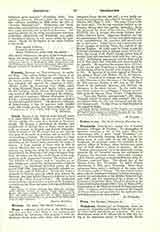

Troas, a suffragan of Cyzicus in the Hellespont. The city was first called Sigia; it was enlarged and embellished by Antigonus, who peopled it with inhabitants drawn from other cities, and surnamed it Antigonia Troas (Strabo, 604, 607); it was finally enlarged by Lysimachus, who called it Alexandria Troas (Strabo, 593; Pliny, V, 124). The name Troas is the one most used. For having remained faithful to the Romans during their war against Antiochus, Troas was favored by them (Titus Livius, XXXV, 42; XXXVII, 35); it became afterwards Colonia Alexandria Augusta Troas. Augustus, Hadrian and the rich grammarian Herodes Atticus contributed greatly to its embellishment; the aqueduct still preserved is due to the latter. Julius Ca sar and Constantine the Great thought of making Troas the capital of the Roman Empire. St. Luke came to Troas to join St. Paul and accompany him to Europe (Acts, xvi, 8-11); there also many of St. Paul’s friends joined him at another time and remained a week with him (Acts 20:4-12). A Christian community existed there and it was at that place that Eutychus was resuscitated by the Apostle. He mentions his sojourn there (II Cor., ii, 12), and he asks Timotheus to bring him his cloak and his books which he had left with Carpus (II Tim., iv, 13). St. Ignatius of Antioch stopped at Troas before going to Rome (Ad Philad., XI, 2; Ad Smyrn., XII, 1). Several of its bishops are known: Marinus in 325, Niconius in 344, Sylvanus at the beginning of the fifth century; Pionius in 451, Leo in 787, Peter friend of the patriarch Ignatius, and Michael, his adversary, in the ninth century. In the tenth century Troas is given as a suffragan of Cyzicus and distinct from the famous Ilium (Gelzer, “Ungedruckte… Texte der Notitim episcopatuum”, 552; Idem, “Georgii Cyprii descriptio orbis romani”, 64); it is not known when the city was destroyed and the diocese disappeared. Today Troas is Eski-Stambul in the sanjak of Bigha.
S. VAILHE

